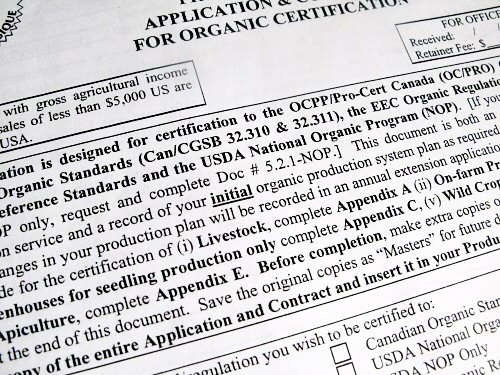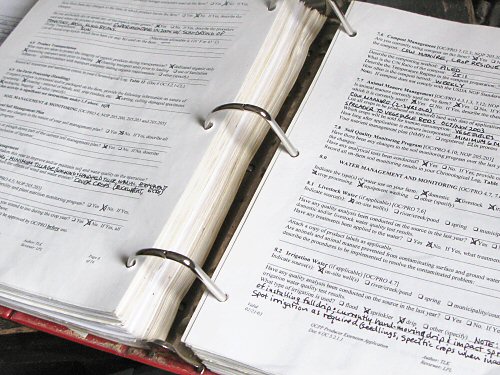
While Obama gets sworn in before the eyes of the world (mine included, on a one-day return to the news), I’m contemplating the stack of paper that leads to organic certification. No connection, today just happened to feel like the day to do it…
We’ve been discussing for a while whether to certify the new farm. The old farm has been certified for six years, right from the start. Back then, I did it because it seemed like the thing to do. Right now, I’m a lot less certain of its value to the truly tiny farm.
In the end, if you’re providing organically-grown local food directly to real, live people—field-to-fork, face-to-face—why would you need a whole bureaucracy and set of regulations and a CERTIFICATE, to assure folks of what they can see for themselves by visiting the farm in person?
If only the world were that simple and straightforward.
We’re getting certified because possessing the right paper does have its advantages, it’s a way to show you are what you say you are, to people who don’t know you first-hand… It may come in handy! That’s our reason for now.

So it’s filling out time. The main application is 25 pages of questions, and there are a couple of extra forms, lists and farm layout maps to include.
Some questions are multiple choice, others are open-ended, and while there are no real “right” answers, answers either do or do not comply with the organic production rules. Compliance is what counts.
The actual production standard is pretty cool, it covers every aspect of organic growing and marketing in great detail—being able to fill out the application means you’ve gotta know some things! :)
The binder is full of previous applications and responses, inspector’s reports, the 60 pages or so of the Canadian organic standard, the US organic standard, in case we want to certify to that, too (they’re pretty much the same on the basics), and various bulletins and notices. Lots of paper.
It looks like a fair bit. In fact, once you’re certified, unless there are big changes in your farming, each year’s renewal application is mainly copying everything from last application and sending a check. After that, an inspector will show up, look around, check your records—you have to keep track of fieldwork, harvests, things like that, also, keep invoices for seed and anything else mentioned the application, like fertilizer and cleaning products—ask some questions, and a couple hours later, it’s done.
Anyhow, here’s to getting the paperwork done and in the mail!
(PS: I do like the grassroots, no-cost, farmer-to-farmer Certified Naturally Grown program, which we started also certifying with last season and intend to continue with! I donated $100 to CNG for 2008, and also bought some signage and stickers. Organic certification costs about $400-500 a year for a tiny farm in Canada.)




Do you have any alternative certification body? Some small “organic” farmers I know in the US have switched their certification from the government’s to the “Certified Naturally Grown” Program. http://www.naturallygrown.org/
One farmer that I talked to switched after a government certified organic inspection of his farm. He passed the inspection after the government official spent an hour looking over his paperwork in the office. The official never even visited the fields! Certified Naturally Grown is inspected by 2 other members of the group and you are expected to inspect some others farms. It seems to be working well for them.
That should keep you busy for the winter. Best of luck!
Organic certification I think can be important just in the sense that the more farms (small or large) that try to recognize those standards in an “official” way, the greater the chance of having the standards really recognized and defined. I still see some mid-size farmers experiencing “squishiness” with calling a particular item organic, and if even the small/micro farms get on board, it can start to become the norm for farmers who embrace the organic process.
But with all that said, I know what you mean about the paperwork and the distance/less relevance it can seem to have for the small farms. I am lucky to have 2 organic certified small farmers near me, and honestly I don’t know how many of its supporters care about the organic label per se – we know the farmer(s), talk to them about the latest/in season crop, know how they grow it, and just generally have the connection to them that is valued in what we recieve.
we have been contemplating doing it for our Olives. It sounds like a nightmare though.
And knowing how much they love red tape here in Spain I can’t see it being any easier. It is something I think I will look in to though.
A piece of paper and an “inspection” never made for safe or clean food.
I considered and investigated the “organic” certification route for my farm about 15 years ago.
At the time “organic” standards for sheep, beef & hogs were a joke.
It was a recipe for animal cruelty.
In the US, Certified Organic was/is a way for large ag corporations to get in on the clean food market.
The “organic” standards have been written and revised with them in mind.
Organic is a tiger without teeth these days.
How many food poisoning cases in the last year were with “organic” food?
Plenty.
For me and my livestock “organic” would have meant Uncle Sam looking over my shoulder in the barn & trying to interfere with my livestock decisions and management.
It would have meant dead ewes every lambing season, pigs with mange and cows with ringworm.
No thanks.
It would have also been a mountain of paperwork and fees.
I’ve never regretted my decision.
These days if somebody wants healthy, clean grass fed clean lamb, pork or beef you can buy it from me direct.
I don’t have to prove my product is good.
That’s more that you can say for Dean Foods and others who are now certified “organic”.
I as the consumer very much appreciate some kind of standard for organics. I can’t grow everything so what I have to purchase, like wheat, I like to know that it is indeed what it says it is.
As a very small farmer I will probably not get certified because all my my clients are close friends and neighbors and they know that I am way to picky about what goes into my kiddo’s mouths than to ever use methods that were anything but safe and wholesome. If I was larger and sold at say farmers markets or to people I didn’t know well I would consider it, but for now I’m keeping it simple!
Granny Miller: couldn’t agree with you more! We don’t really want or need Uncle Sam to tell people that our veggies are “organic” and safe. We sell at the Farmer’s Markets and have a CSA and all of our customers are very comfortable with our naturally grown produce. Our customers know they’re welcome to come to our farm anytime they’d like and we’ll give them a tour and show them exactly how their veggies are grown. We don’t want to work with any chemicals (and risk our own safety!) or eat anything grown that way. We’ve had customers ask us if we’re “organic” and we explain to them why we’re not certified organic and how we grow our produce naturally, without chemicals, and we’ve never had anyone decide not to buy from us. The less government involvement, the better!
As a small producer who cannot afford either the time or the cost of being organically certified, I have chosen to go with Certified Naturally Grown which is http://www.naturallygrown.org/ . This organization is recognized nationally as being organic and is inspected by others in the organization. I have found it very helpful. As a member I am able to use their colorful logo on all produce I sell. They also provide bumper stickers and banners for use at Farmer’s Markets.
I’ve been stating this fact for over 6 years now to anyone who asks, “Our only certification is in hard work and honest sweat.” I find it un-neighborly, un-neccesary and point blank ridiculous that to use words such as “organic or naturally grown” a farmer now must jump through hoops.
The farm we purchase all of our diary/beef/chicken/eggs from just dropped their certification. Now that they sell to all individuals they decided it wasn’t worth the $1000 fee each year. They also had trouble finding certified organic hay for their animals. They have friends that grow organically but aren’t certified, so they buy from them.
I don’t mind that they don’t have the certification any more. I know that they’re doing their part to be an environmentally friendly and sustainable as they can in their farming practices.
This is one reason to eat locally and have a relationship with those that produce your food. I can visit all the farms I buy stuff from and I know exactly how their treat their animals and their land.